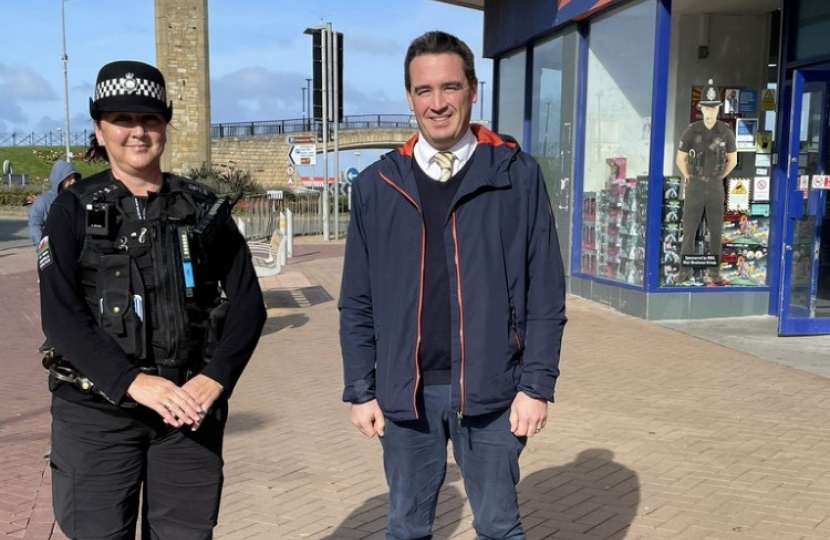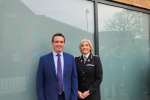With a number of towns and villages in the Vale of Clwyd being subject to anti-social behaviour from time to time, Dr James Davies MP has welcomed the Anti-social Behaviour Action Plan announced by the Prime Minister yesterday.
The plan will establish a zero-tolerance approach to anti-social behaviour, ensuring people feel safe at home and when out and about.
James believes the plan will be beneficial to the Vale of Clwyd where anti-social behaviour can be a problem, despite the best efforts of the police.
He said:
“I have long emphasised the need to take a firm approach to tackle anti-social behaviour and during my time as an MP I have been working with local police on this agenda.
“I have previously taken to the streets in Rhyl Town Centre with the police to find out more about the problems they are having to deal with and to discuss the actions they are taking to address anti-social and intimidating behaviour.
“Recently there have been problems in Denbigh, where last month a dispersal order was put in place due to repeated and ongoing issues of disorder, assault, and antisocial behaviour by local youths, who have been congregating in large groups.
"In Prestatyn I have been pushing for a permanent police base in the town centre. This would help deal with incidents of anti-social behaviour that residents and businesses are reporting there, particularly in the Ty Nant and shopping park area. There have also been occasional issues in St Asaph and Rhuddlan.
“Anti-social behaviour is unacceptable. It prevents people from spending time in their local area, makes women and girls feel unsafe, and erodes a sense of community. Tackling this crime is key to levelling up and restoring pride in local communities.
“That is why we are cracking down on offenders with swifter and more visible justice, tougher punishments, a ban on the abuse of nitrous oxide, a stronger policing response in anti-social behaviour hotspots, and new tools for communities to regenerate and restore local pride.
“Anti-social behaviour is sometimes referred to as "low-level crime", but its impact on a community can be extensive.
“Those responsible for this type of behaviour need to know that anti-social behaviour simply won’t be tolerated and this new plan sends out that message loud and clear.”
Prime Minister Rishi Sunak said:
“Anti-social behaviour undermines the basic right of people to feel safe in the place they call home.
“The public have rightly had enough – which is why I am determined to restore people’s confidence that those responsible will be quickly and visibly punished.
“This action plan maps out how we will tackle this issue with the urgency it deserves and stamp out these crimes once and for all – so that wherever you live, you can feel safe in, and proud of your community.”
Offenders, who will be made to wear high-vis vests or jumpsuits and work under supervision, could be made to pick up litter, remove graffiti and wash police cars as punishment for their actions, and victims of antisocial behaviour from the local community will be given a say in offenders’ punishments to ensure justice is visible and fits the crime. These initiatives will be launched as soon as possible and follow research that shows that anti-social behaviour is the main reason people do not feel safe in their local area.
Under the zero-tolerance approach, nitrous oxide or “laughing gas” will also be banned. This sends a clear message to intimidating gangs that hang around high streets and children’s parks and litter them with empty canisters, that they will not get away with this behaviour. The drug is now the third most used among 16 to 24-year-olds in England and both the police and public have repeatedly reported links between use of the drug and nuisance or anti-social behaviour.
Police will also be given new powers to crack down on illegal drug use - often a catalyst for other crimes - including expanding powers for drug testing on arrest. This will allow more suspected criminals to be tested, and more drugs tested for, including ecstasy and methamphetamine. Currently, only suspected criminals who have committed certain offences can be tested in police detention without additional requirements, but we will expand the range of trigger offences to include crimes linked to violence against women and girls, serious violence and anti-social behaviour.
A new reporting tool will also be developed over the next twelve months to act as a digital one-stop shop where people can quickly and easily report incidents of anti-social behaviour when these occur. The tool will help address problems people have faced when trying to report these kinds of crimes, because of a lack of clarity around how to raise an issue or whom to speak to, or a lack of confidence that such crimes will be dealt with seriously.

